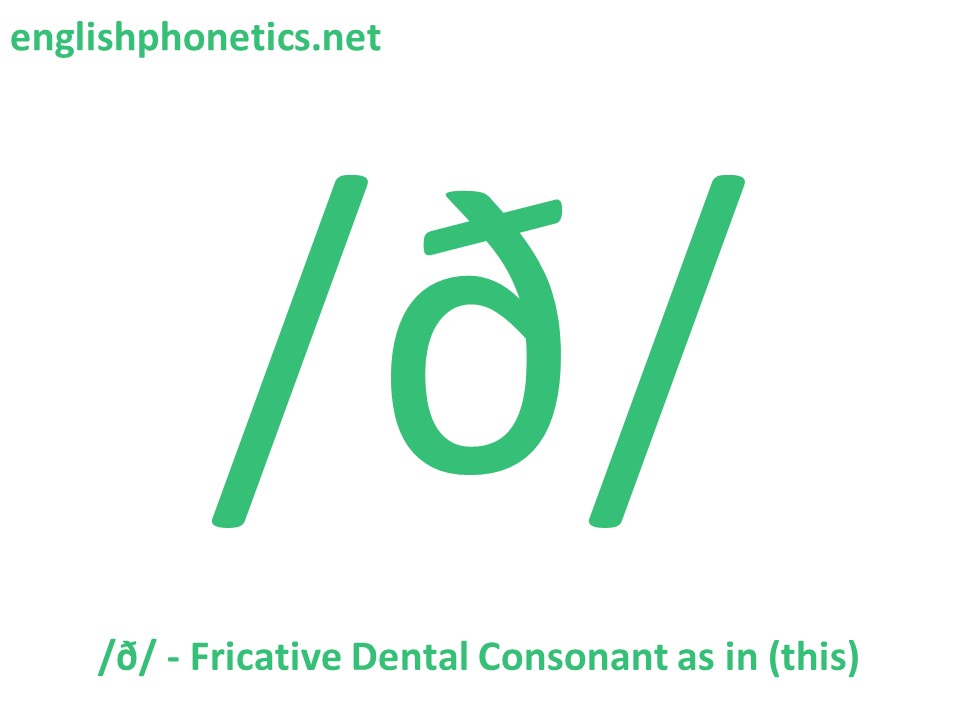Spelling:
- "th" – that, northern
- "the" - breathe, bathe
LISTEN
The consonant /ð/ can be in these consonant clusters:
-
Beginning of a Syllable
(none)
-
End of a Syllable
Note: the sound /θ/ (as in
“thin”, “think’) is also spelled "th". The sound
/θ/ is more common, while the sound /ð/ most frequently occurs in
grammatical words (that, them, those) or in the middle of words before
-ing or -er (father, clothing).
| eth_grammar.mp3 |
Grammar Tip:
The article “the” and all demonstrative pronouns (“this, that, these, those”) contain /ð/. These words are very common in spoken English and are often used before nouns.
The article “the” and all demonstrative pronouns (“this, that, these, those”) contain /ð/. These words are very common in spoken English and are often used before nouns.
- the girl
- this book
- that car
- these students
- those boys
| eth_grammar2.mp3 |
Also, the sound /ð/ is in several important
connecting words. These words are more common in
writing, but they may also be used in formal speaking.
- although
- therefore
- furthermore
COMPARE
Compare /ð/ with /d/:
| compare_eth-d_1.mp3 |
/ð/.../d/.../ð/.../d/.../ð/.../d/…
These are both voiced consonants pronounced in a similar position. However, /ð/ is a voiced dental fricative and /d/ is a voiced alveolar stop.
These are both voiced consonants pronounced in a similar position. However, /ð/ is a voiced dental fricative and /d/ is a voiced alveolar stop.
You can hear the difference between /ð/ and /d/ in these words.
| compare_eth-d_words.mp3 |
1. A. those, B. doze
2. A. then, B. den
3. A. breathe, B. breed
4. A. loathe, B. load
5. A. worthy, B. wordy
6. A. mother, B. mutter
2. A. then, B. den
3. A. breathe, B. breed
4. A. loathe, B. load
5. A. worthy, B. wordy
6. A. mother, B. mutter
Now, compare /ð/ with /z/:
| compare_eth-z_1.mp3 |
/ð/…/z/…/ð/…/z/…/ð/…/z/…
These are both voiced fricatives pronounced in a similar position. However, /ð/ is a voiced dental fricative and /z/ is a voiced alveolar fricative.
These are both voiced fricatives pronounced in a similar position. However, /ð/ is a voiced dental fricative and /z/ is a voiced alveolar fricative.
You can hear the difference between /ð/ and /z/ in these words.
| compare_eth-z_words.mp3 |
1. A. writhe, B. rise
2. A. then, B. zen
3. A. clothe, B. close
4. A. bathe, B. bays
5. A. breathing, B. breezing
6. A. soothe, B. sues
2. A. then, B. zen
3. A. clothe, B. close
4. A. bathe, B. bays
5. A. breathing, B. breezing
6. A. soothe, B. sues
PRACTICE
Listen and repeat these words:
| words_with_-eth-.mp3 |
|
1. these
2. theirs 3. then 4. themselves 5. therefore 6. loathe 7. soothe 8. bathe 9. clothes 10. worthy |
11. weather
12. brother 13. either 14. southern 15. breathing 16. rhythm 17. algorithm 18. furthermore 19. otherwise 20. motherly |
Now, practice /ð/ in sentences. Say the words first, then the sentences.
| sentences_with_-eth-.mp3 |
1. rather – bother
– this
I’d rather not bother with this class.
2. those – mother – father
Those plants are for my mother and father.
3. the – weather – southern
The weather in the southern US is very warm.
4. another – this – leather
I want another coat, not this leather one.
5. although – farther – rather
Although it’s farther away, I’d rather fly out of Chicago.
6. whether – other – clothing
I’m not sure whether the other clothing will fit me.
I’d rather not bother with this class.
2. those – mother – father
Those plants are for my mother and father.
3. the – weather – southern
The weather in the southern US is very warm.
4. another – this – leather
I want another coat, not this leather one.
5. although – farther – rather
Although it’s farther away, I’d rather fly out of Chicago.
6. whether – other – clothing
I’m not sure whether the other clothing will fit me.
To practice with different varieties of English, choose another native English speaker by clicking one of the links below:


